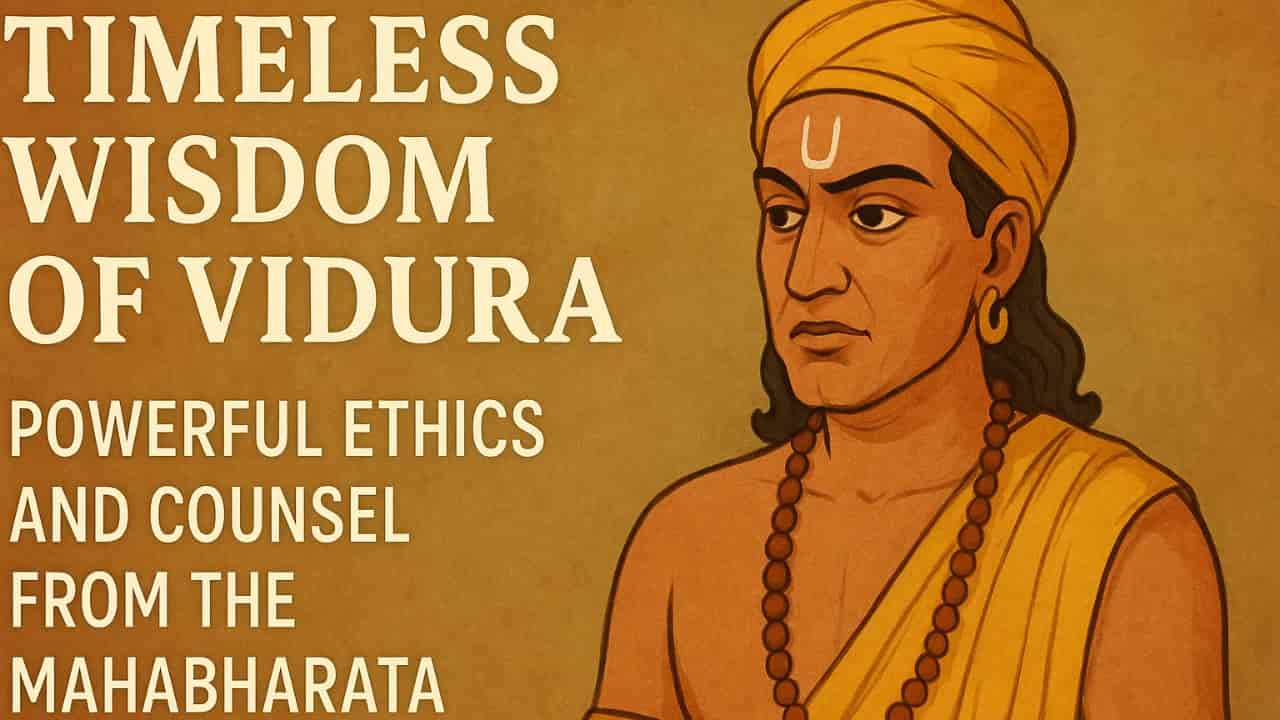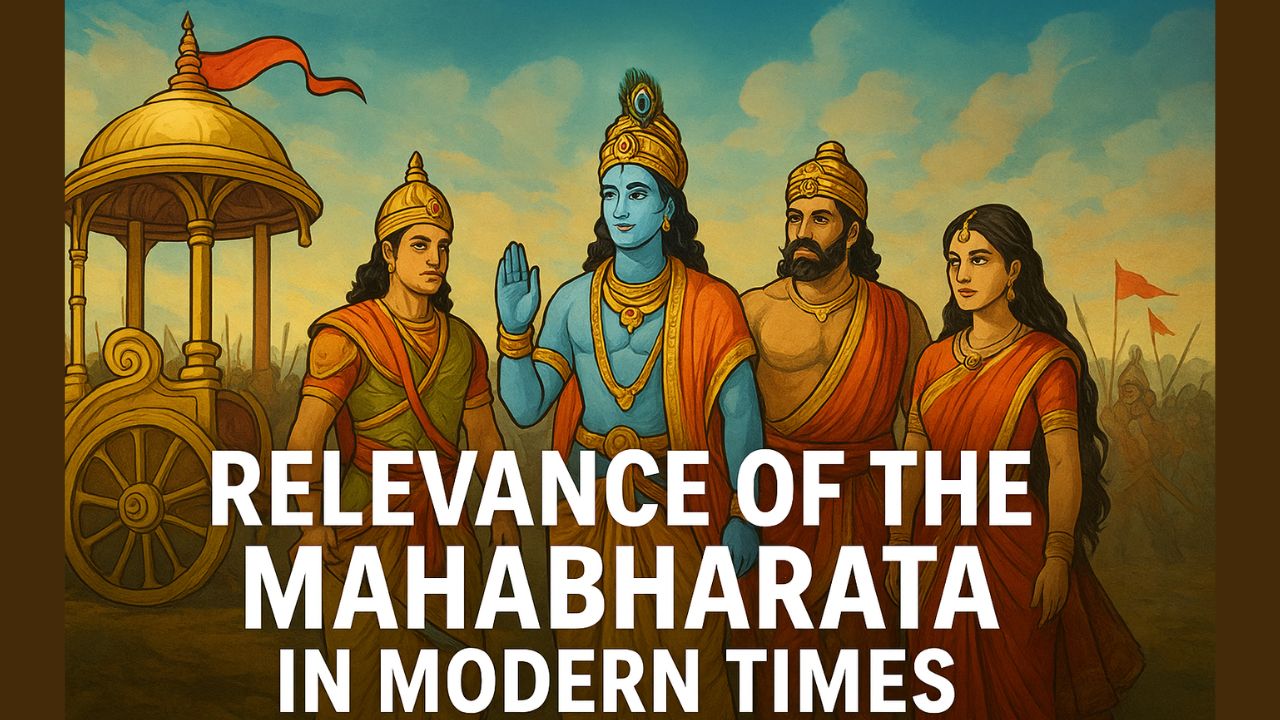
Vidura Niti: A Silent Pillar in a Tumultuous Court
In the grand tapestry of the Mahabharata, where kings wage wars, sages curse dynasties, and gods intervene in mortal affairs, Vidura stands apart, not as a warrior or a ruler, but as a voice of reason.
Born of a maid and the sage Vyasa, Vidura was denied royal status but granted something far more enduring: wisdom. His presence in the Kuru court was quiet yet profound, his words often ignored but never without consequence.
Vidura’s life is a study in dharma, not the dharma of battle or sacrifice, but the dharma of counsel, restraint, and moral clarity. He was the conscience of Hastinapura, the advisor who spoke truth to power, even when it cost him favour.
In a world torn between ambition and righteousness, Vidura chose the path of integrity. His story is not one of conquest, but of conviction. His legacy is not carved in stone, but etched in the ethical fabric of Indian thought.
This article explores Vidura’s role, teachings, and legacy as one of the most principled minds in Indian mythology, a man whose wisdom continues to resonate across centuries.
Birth and Identity: Wisdom Beyond Lineage
Vidura was born from the union of Sage Vyasa and a palace maid, making him the half-brother of Dhritarashtra and Pandu. Though denied the throne due to his birth, he was raised within the palace and educated in statecraft, philosophy, and ethics. His intellect and impartiality earned him the position of chief counsellor to the Kuru dynasty.
Unlike his royal brothers, he had no ambition for power. His identity was shaped not by lineage but by learning, not by privilege but by principle. He embodied the ideal that wisdom and virtue transcend birth, a theme echoed throughout Indian philosophy, where character outweighs caste and knowledge surpasses nobility.
Vidura Niti: The Philosophy of Governance and Ethics
Vidura’s teachings, compiled as Vidura Niti, form one of the earliest treatises on ethical governance. Delivered to King Dhritarashtra during the Mahabharata’s most critical moments, these verses cover a wide range of topics:
- Leadership and Justice: A king must be impartial, compassionate, and guided by dharma. He warns against favouritism, cruelty, and impulsive decisions.
- Wealth and Morality: Wealth earned without virtue leads to ruin. Generosity must be tempered with wisdom, and prosperity must serve the greater good.
- Self-Control and Discipline: A wise man controls his anger, desires, and speech. He emphasizes restraint as the foundation of wisdom.
- Friendship and Loyalty: True allies are those who speak truth, not flattery. Loyalty must be earned through integrity, not manipulation.
Vidura Niti is not just political advice; it is a moral compass. It blends practical governance with spiritual insight, making it relevant even in contemporary leadership discourse.
The Voice of Conscience in the Kuru Court
Throughout the Mahabharata, Vidura Niti serves as the moral compass of Hastinapura. He warns Dhritarashtra against Duryodhana’s schemes, advises against the dice game, and pleads for peace before the war. His counsel is often ignored, but his integrity never wavers.
When Draupadi is humiliated in the court, Vidura is one of the few who speak out. He condemns the act and reminds the elders of their duty to uphold dharma. His courage in standing against injustice, even when powerless to stop it, marks him as a true sage.
His role is not dramatic, but it is essential. He is the quiet voice that challenges tyranny, the advisor who chooses truth over comfort, and the man who remains loyal to dharma even when the world turns away.
Relationship with Krishna: Mutual Respect and Spiritual Kinship
Vidura’s relationship with Krishna is one of mutual respect. When Krishna visits Hastinapura, he chooses to stay at Vidura’s humble home rather than in the palace. This act symbolizes Krishna’s recognition of his purity and wisdom.
Their conversations reflect deep spiritual understanding. He is not dazzled by Krishna’s divinity; he engages with him as a seeker, a thinker, and a friend. Krishna, in turn, treats him as an equal, acknowledging his insight and moral clarity.
This bond elevates his status from a court advisor to a spiritual figure. It also reinforces the idea that true greatness lies in character, not in wealth or status.
Vidura’s Departure and Final Days
Disillusioned by the court’s refusal to heed his advice, Vidura eventually leaves Hastinapura. He spends his final days in contemplation and spiritual pursuit. In some versions of the Mahabharata, Vidura is said to merge with Yama, the god of death, symbolizing his embodiment of justice and moral order.
His departure is quiet, like his life. But it marks the end of an era, the exit of conscience from a court consumed by ambition. His final act is not of defiance, but of detachment. He walks away from power, choosing peace over politics.
Vidura Niti and the Question of Dharma
Vidura’s life raises profound questions about dharma. Is it enough to speak the truth, even if no one listens? Is loyalty to a corrupt king still a virtue? Can wisdom survive in a world ruled by ego?
Vidura’s answers are subtle. He does not rebel, but he does not conform. He advises, warns, and pleads, but he never compromises. His dharma is not about winning; it is about witnessing, guiding, and remaining true to one’s principles.
In this sense, Vidura represents a unique form of heroism, one that does not fight battles but preserves values.
Relevance Today: Ethics in Leadership and Public Life
In an age of political turmoil and ethical ambiguity, Vidura Niti offers clarity. His emphasis on truth, restraint, and justice is a reminder that leadership is not about dominance but about service. His life encourages us to value conscience over convenience, wisdom over wealth, and dharma over desire.
Modern governance, corporate leadership, and public discourse can benefit from Vidura Niti. His insights on decision-making, conflict resolution, and moral responsibility are timeless.
Literature and Cultural Memory
Though not as popular as Arjuna or Krishna, Vidura has found a place in Indian literature, theatre, and philosophy. His character is often invoked in discussions on ethics, caste, and political counsel.
In regional retellings, Vidura is portrayed as a sage, a philosopher, and a silent revolutionary. His humility and wisdom make him a favourite among thinkers and reformers.
The Unheard Voice That Echoes Still
He may not have wielded a sword or sat on a throne, but his words shaped the destiny of empires.
He was the voice that warned, the heart that felt, and the mind that reasoned.
In the Mahabharata’s storm of ambition and conflict, he was the stillness of wisdom.
His story is a tribute to those who speak truth in silence, who choose principle over power, and who remain steadfast in the face of moral compromise. His wisdom is not just ancient, it is eternal.
In a world that often celebrates noise, Vidura reminds us of the power of quiet conviction. His legacy is not in victories, but in values. And in every moment of ethical doubt, his voice still echoes, calm, clear, and courageous.

